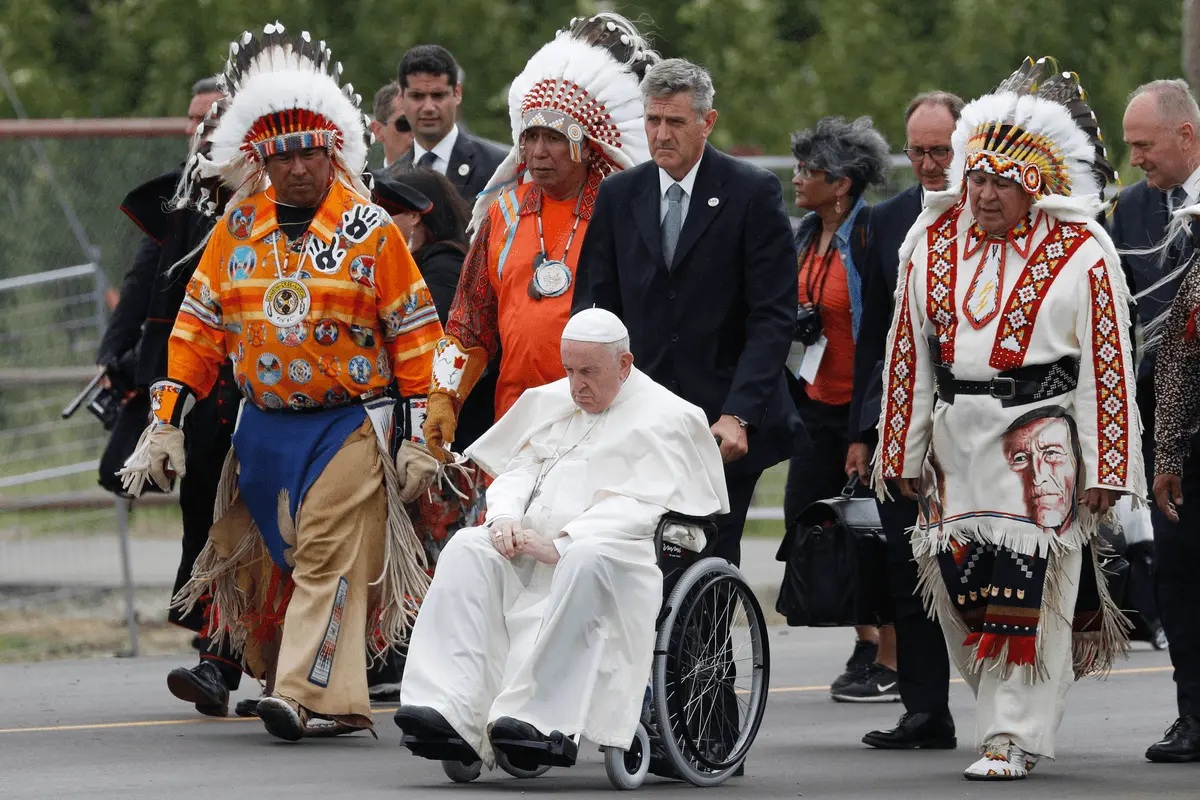Creation in God’s image just the beginning
Pictured left: Pope Francis arrives with Indigenous leaders for a meeting with First Nations, Métis and Inuit communities at Maskwacis, Alberta, July 25, 2022.
What does it mean to be created in God’s image? We know from Genesis 1.27 that people are created in God’s image. However, since God is unseen and unseeable, our response to this question must necessarily be the result of groping in the darkness.
It’s one of the most important questions we face. Some are born strong, others weak; some intelligent, others not so much; others into rich, nurturing environments, others into deprivations of various sorts. Yet because we are all created in God’s image, we are equal. Although it is often not the case, we should all have equal rights and equal opportunities.
However, this putative equality is a consequence of our imaging God, not the essence of what it means to reflect God’s image.
At the Sept. 30 Mass I attended at Edmonton’s Sacred Heart Church of the First Peoples to mark the National Day for Truth and Reconciliation, Father Mark Blom spoke of those residential school survivors who come to the church rectory asking to talk with a priest.
Blom, an Oblate of Mary Immaculate, the religious congregation that ran many of those residential schools, listens to the stories of pain and abuse his visitors tell.
Some women make child-size moccasins to donate to the parish. At times like this, those moccasins become useful. After his visitor has finished telling their story, Father Mark gives a pair of those moccasins to the one who has experienced such pain.
He then tells the survivor that although they have been devastated and broken by the actions of others, those actions can never destroy the core of goodness within them. They still possess a childhood within that is indestructible.
Blom did not speculate on the effect the gift of moccasins has on his hearer. Just as we cannot know the spirit that lives in another person or the depths to which that spirit has been shattered by abuse and the loss of family and culture, so we cannot observe the healing that occurs within another’s soul.
Although abuse is forced upon a person, healing requires a choice by the one who seeks healing. Personal change is never easy. It is even more difficult when one must overcome the deep-seated resentment and anger that are the product of having one’s selfhood torn asunder by a hostile exterior force. The choice one must make is to forgive. Implementing that choice may seem impossible. For many (most?) humans, it can take decades.
That indestructible core of goodness that images God is the hope for reconciliation. It is the internal source of what St. Paul called the “eternal weight of glory beyond all measure.” A slag heap may bury that core so deep that one may forget it is there. Nevertheless, it is never destroyed.
The core of goodness in the hearts of the people is what brought down the mighty Soviet Empire, what led one lone man to stand boldly in front of a tank entering Tiananmen Square and, yes, what led thousands of Europeans to abandon their comfortable lives to become missionaries in far-flung lands. One need not be indifferent to repression and suffering. One can choose to act.
Human ignorance and frailties mean that even our best efforts may still cause enormous damage. However, the prospect of doing wrong should not extinguish our yearning to do good. Sitting on the comfortable sidelines of history and accepting evil as though it is inevitable is the worst we can do.
What are the prospects for reconciliation? That question is unanswerable. Reconciliation always depends on the choices we make. In Latin America, the gulf between Indigenous people and the descendants of the conquerors remains enormous after 500 years. Efforts at reform and justice are often brutally quashed.
Can Canada do better? We have made a start. A recent poll published in The Globe and Mail showed that both Indigenous and non-Indigenous Canadians have a significantly more positive view of the state of relations between the two groups than was the case five years ago.
Yet, we must remain aware that reconciliation is always easier for those who have power than for those who don’t. The burden of repression borne by Indigenous people means they will take longer to gain the freedom to say, “I forgive.” We are all created in God’s image. However, the effort required to find that image within is much greater for some than for others. To achieve reconciliation, we must walk together, or we will not walk at all.
By Glen Argan
Published on The Catholic Register website


